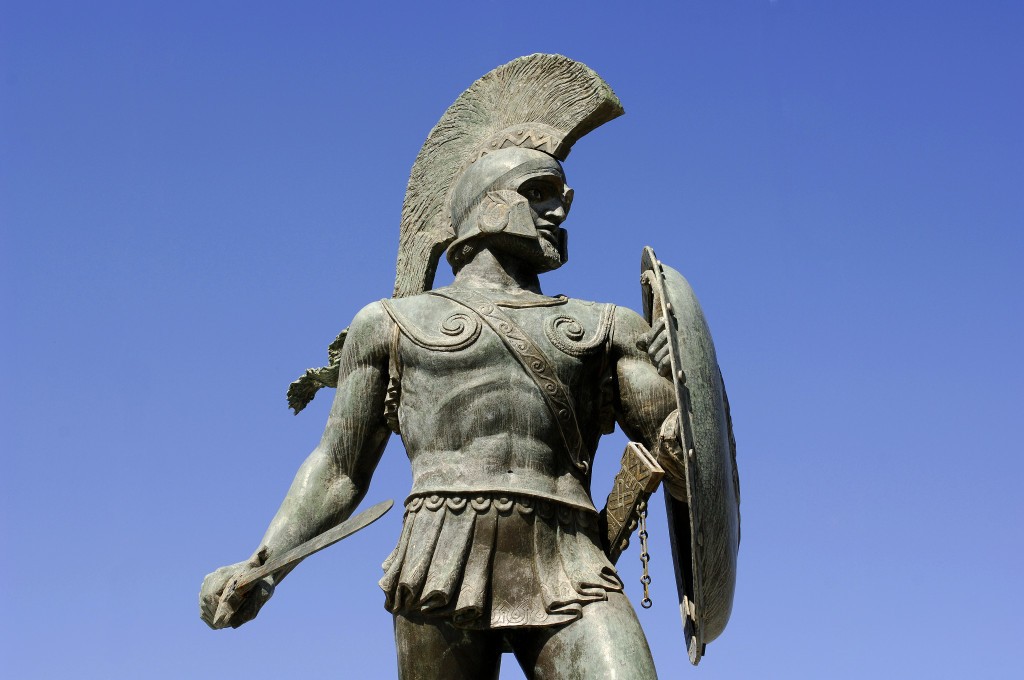Spartan youngsters faced their first obstacle the second they were born: their father. If their father found a birth defect or otherwise rejected the child, he or she was literally left to the wolves. A child deemed worth raising was raised by its mother until it was seven years old, but boys accompanied their father to the syssitia (τὰ συσσίτια, tà sussítia, dining clubs) where he would sit on the floor and learned what it was like to be a Spartan man through watching and listening.
The laws of Sparta were developed and written by Lycurgus, a legendary lawmaker who, in the 7th century BC reorganized the political and social structure of the polis, transforming it into a strictly disciplined and collective society. He also developed the stringent military academy of the agoge (ἀγωγή, agōgē), where Spartan boys were trained from childhood to adulthood in three stages: the paídes (about ages 7–17), the paidískoi (ages 17–19), and the hēbōntes (ages 20–29).
Lycurgus instituted the practice of appointing a state officer, the paidonomos (παιδονόμος, paidonómos, boy-herder) who organized the boys into divisions of about 60 each called agelai (ἀγέλαι, agélai, herds). These were groups of peers of the same age. Most of their time was spent in this compan. The agelai were under the supervision of an eiren (εíρήν, young adult) aged about 20, at whose house the agelai ate.
Children went barefoot to encourage them to move swiftly, and they are encouraged to learn to withstand the elements by having only one outfit. They were never satiated with food or fed fancy dishes. If the boys wanted more food, they went on hunts or raids. Their stealing was not only allowed but encouraged--but if they got caght, they suffered floggings. If they made a sound during their punishment, they were flogged again. From Plutarch's Life of Lycurgus comes this little titbit:
"The boys make such a serious matter of their stealing, that one of them, as the story goes, who was carrying concealed under his cloak a young fox which he had stolen, suffered the animal to tear out his bowels with its teeth and claws, and died rather than have his theft detected." [18.1]
During the day, the boys played ball games, and learned to ride and swim. They studied dance as a kind of gymnastic training for war dances as for wrestling. This was so central that Sparta was known as a dancing place from Homeric times. It is not clear whether they learned to read; Sparta abhorred written records and laws, and prided themselves on not needing them. After dinner, the boys sang songs of war, studied history, and discussed morality with the eiren. He also quizzed them, trained their memory, logic, and ability to speak laconically. They slept on reeds.
And what of Sparta's girls? The law reforms of Lycurgus also included certain rules and allowances for them. Spartan women were seen as the vehicle by which Sparta constantly advanced. Unlike many other ancient Hellenic girls, they were afforded formal education as well, although it seems they lied at home with their mothers instead of being into room and board like the boys. They also could not use their education to have careers or earn money.
Spartan girls were forbidden from wearing any kind of makeup or enhancements. The girls would exercise outdoors, unclothed, like the Spartan boys, which was impossible in the rest of the ancient Hellenic world. They also participated in athletics, competing in events like footraces.
Giving Spartan girls a physical (and mental) education was seen as a guarantee that the strong and fit Spartan women would reproduce, and when they had babies, those babies would be strong warriors in the making. I note the mental aspect because Spartan women of all ages mingled, in public, with Spartan men. Through these meetings, they learned many of the intellectual pursuits of the men and the ancient Spartan women were infamous for their ability to trade conversation and give political commentary. They were known for their razor-sharp wit and outspoken natures.
Their methods worked: Around 650 BC, Sparta rose to become the dominant military land-power in ancient Hellas and held that position for almost 300 years.

That's a great and informative blog, about the spartan girl. And according to Xenophon and Plutarch, I Read that Spartan education started even before a child was born. Spartans required that girls and women participate in education, especially physical training because it helped them have more resilient offspring. Also, there is an effective and reliable Assignment writing service for those students who can not complete assignment projects due to lack of time and keep in mind peace and stress-free.
ReplyDeleteWhat a fascinating read about education in Sparta! It's amazing how dedicated girls and women are to physical training, even before they are born. It's illuminating to relate this to the idea of resilient progeny. In connection with this, you make an excellent point about an efficient Marketing Topics For Research writing service. Students must have a dependable service for peace of mind when managing their dissertations under time restrictions. Excellent thoughts that harmoniously combine historical context with modern answers
ReplyDeleteAbsolutely! The Spartans' reputation for toughness endures for a reason—they dedicated every moment to honing their skills and strengths. It's a reminder that consistent effort and commitment lead to remarkable outcomes. Ready to invest in your own growth? I need to focus on my online class right now, so I'm avoiding these distractions.
ReplyDeleteThe focus on rigorous education from birth truly set Sparta apart in the ancient world. It's fascinating how this dedication to discipline and excellence shaped their society. Similarly, students today can enhance their academic prowess with resources like cheap essay writing services UK, providing affordable access to quality educational support that hones their writing skills and intellectual growth. Sparta's legacy indeed offers timeless lessons!
ReplyDelete